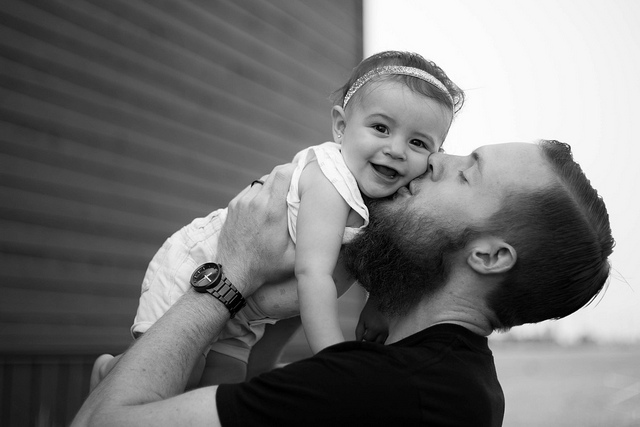ACLU issues a complaint over J.P. Morgan's Sexist Parental Leave Policy
By:
Can dads be primary caregivers, too? This is the crux of a complaint filed against J.P. Morgan & Co. A former J.P. Morgan employee has, in partnership with the ACLU, issued a complaint to the Equal Employment Opportunity Commission—the first step in what could become a long legal battle over the company's parental leave policy.
 Salim Virji - flickr.com
Salim Virji - flickr.com
Derek Rotundo explained his predicament in a blog post published on the ACLU's website.
Writing about his struggle with the company's H.R. department, Derek Rotundo said, "J.P. Morgan gives 'primary caregivers' 16 weeks of paid parental leave, while 'secondary caregivers' get only two weeks."
"I explained that I wanted to be the primary caregiver for my baby son," he continued. "I was shocked by the response: J.P. Morgan said that only mothers are automatically considered to be primary caregivers. The company then said that if I wanted additional paid leave as a father, I would have to show that either my wife had returned to work—which is not possible in our case, as my wife is a special education teacher currently on summer break—or that the child’s mother was 'medically incapable of providing any care for the child.'"
 Chris Price - flickr.com
Chris Price - flickr.com
Rotundo believes that J. P. Morgan's policy enforces outdated gender norms.
While perhaps it was more common in the 1950s for men to go to work and women to stay home, more and more families are carving out a different path. In the past 30 years alone, the percentage of women who are the primary breadwinner in their household has risen dramatically. Rotundo believes that the leave policies of a 21st-century company should reflect these changes, rather than financially reinforcing an outdated conception of familial duties.
"In modern America, fathers want to play a significant role in caring for their children," he wrote. "Working families like mine want corporate policies that strike a fair balance between work and family. J.P. Morgan’s parental leave policy is outdated and discriminates against fathers who want a meaningful amount of time off to be at home with their kids—just like mothers who work for the company. The policy also discriminates against both moms and dads by enforcing two related stereotypes: that raising children is women’s work and that only men should return to work immediately after their children are born."
 Chris Hunkeler - flickr.com
Chris Hunkeler - flickr.com
The situation is a reminder that gender norms hurt men, too.
While much has been made of the impacts of gender roles on women—limited opportunities, mommy tracking, etc.—these societal standards hurt men, and families too. According to a 2015 article from the Economist, there were three marked positives to giving men more than two weeks of paternity leave (which countries like Denmark have).
"First, fathers who take paternity leave are more likely to take an active role in child-care tasks," the Economist reported, based on a study of the U.S., Britain, Denmark, and Austrailia. And Danish men, 90 percent of whom take more than two weeks of parental leave, were the most likely to play with their children. Second the Economist reports, "[a] study by the University of Oslo found that paternity leave improved children’s performance at secondary school; daughters, especially, seem to flourish if their dads had taken time off." And finally, as already mentioned, paternity leave helps women's careers (and wages) by not placing the burden of child care on the mother.
By disincentivizing men from being primary caregivers, J.P. Morgan is making it harder for parents to make the right choice for themselves and their children.
